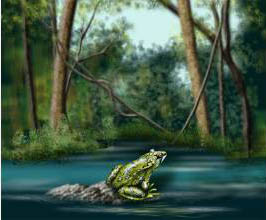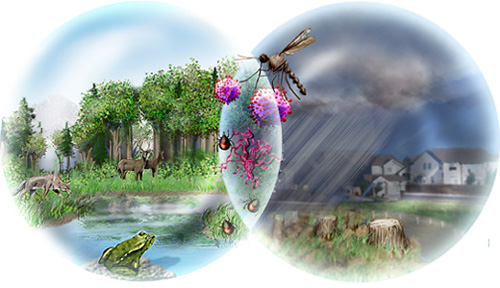West Nile virus. Hantavirus. Lyme disease. All are infectious diseases spreading in animals, and in humans. Is our interaction with the environment somehow responsible for the increase in incidence of these diseases?

Pathogens, or disease-causing microbes, "rarely cause extinctions in the species they infect," said James Collins, NSF Assistant Director for Biological Sciences. "There are a few examples, however, where a pathogen may have resulted in extinction of a species." Frogs in El Cope, Panama, affected by a fungus called chytridiomycosis are a case-in-point. One frog species there which lived along riverbanks disappeared completely within one month. Credit: Nicolle Rager Fuller, National Science Foundation |
A joint National Science Foundation (NSF) and National Institutes of Health program -- ecology of infectious diseases (EID) -- supports efforts to understand the underlying ecological and biological mechanisms behind human-induced environmental changes and the emergence and transmission of infectious diseases. Projects funded through the EID program and other NSF programs allow scientists to study how large-scale environmental events—such as habitat destruction, invasions of non-native species and pollution—alter the risks of emergence of viral, parasitic and bacterial diseases in humans and animals.
"Researchers supported in the EID program are advancing basic theory related to infectious diseases," said James Collins, NSF Assistant Director for Biological Sciences, "and applying that knowledge to improve our understanding of how pathogens spread through populations at a time of increasing global change."
The benefits of research on the ecology of infectious diseases include development of theories of how diseases are transmitted, improved understanding of unintended health effects of development projects; increased capacity to forecast disease outbreaks and knowledge of how infectious diseases emerge and reemerge.
"Virtually all the world's terrestrial and aquatic communities have undergone dramatic changes in biodiversity due primarily to habitat transformations such as deforestation and agricultural intensification, invasions of exotic species, chemical contamination and climate-change events," said Sam Scheiner, ecology of infectious diseases (EID) program director at NSF. "The coincidence of broad-scale environmental changes with the emergence of infectious diseases may point to underlying and predictable ecological relationships."
Examples of studies funded by the EID program include research on the origin and spread of the aspergillus-gorgonian coral disease and how climate and environment may have worked as facilitators of the disease; effects of human-induced change on the ecology of human pathogens in North Carolina’s Neuse River estuary, which is polluted by excess nutrients from human activities; the microbial community ecology of tick-borne human pathogens; plague as a model for disease dynamics; ecological reasons for rodent-borne disease outbreaks; and how social organization influences an infectious disease outbreak.
Further information about EID program support is available in the latest program solicitation.

